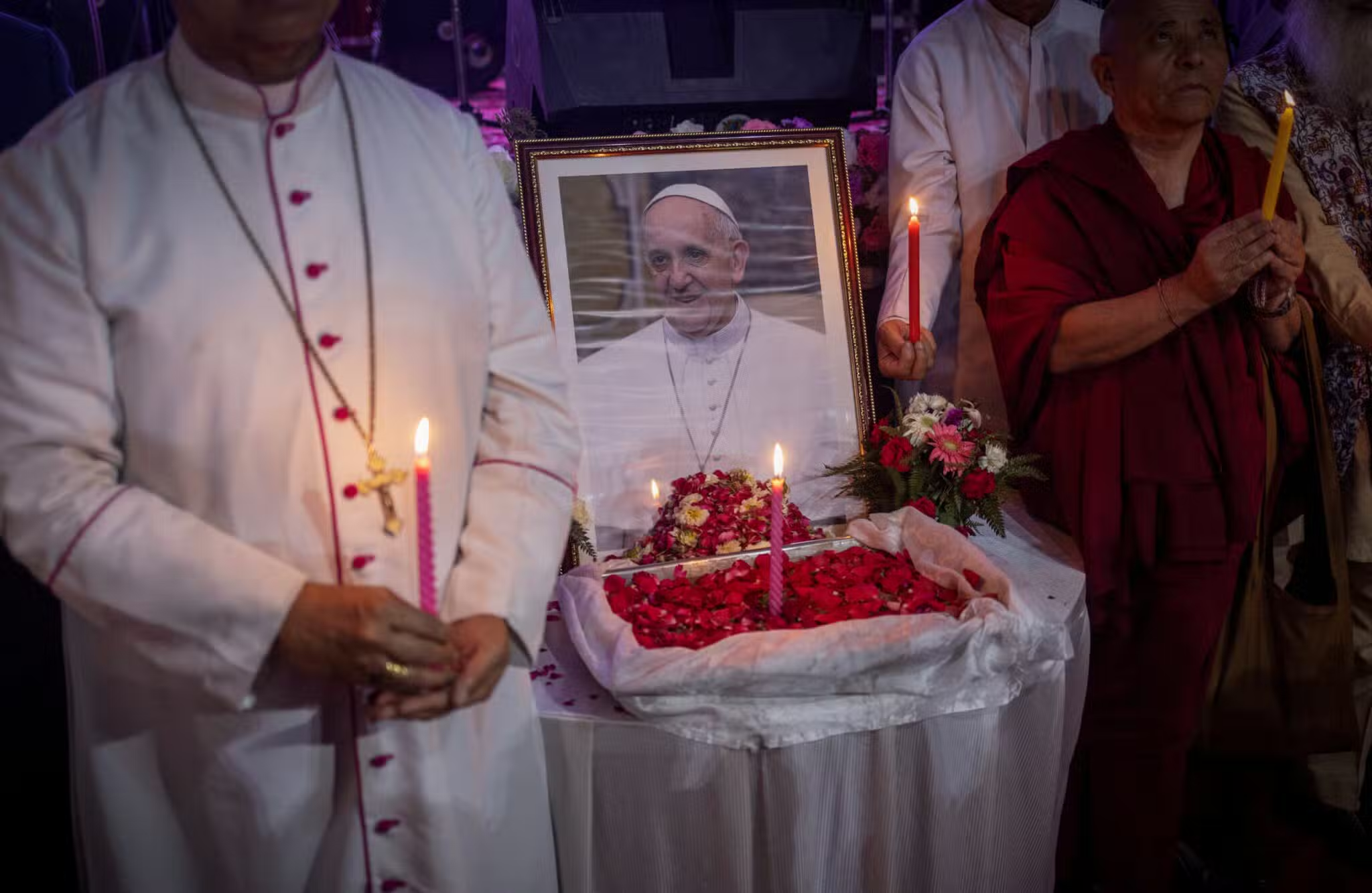(OSV News) — Secrecy and gossip. Intrigue and politicking. Unexpected twists and startling revelations.
It’s all perhaps the stuff of the recent U.S. elections — but also the plot machinery of the blockbuster mystery thriller film “Conclave.”
Expected to top $30 million in ticket sales by the time it transitions from movie theaters to streaming services, secular reviews are exuberant and Academy Award buzz abounds.
Why is the movie so popular — even if not with some Catholics?
“I think that the appeal comes from a desire to get an inside look into a process that is alien to a lot of people, particularly to secular people,” said Michael Coy, media production manager and host of the Catholic Film Club podcast at Benedictine College in Atchison, Kansas. “The pope is still a world figure — even if Catholicism is not as central a part in people’s lives as it used to be.”
Jesuit Father Jake Martin, a clinical assistant professor of film, TV and media studies at Loyola Marymount University in Los Angeles, suggests the acclaim is owing to the film’s craft.
“I think first and foremost, it’s a really well-made film, and it’s good storytelling — it tells its story very well, just from a technical point of view,” he said. “That’s a difficult thing to do.”
“As a film scholar, I’m not taking it as necessarily a reflection of the actual church, but as someone who’s aware of how stories need to be told, and what needs to be done in order to keep momentum and pacing and stuff like that going,” he added.
Released Oct. 25 in the United States by Focus Features, the arthouse film division of NBCUniversal, the film’s talented cast includes Ralph Fiennes, Isabella Rossellini and Stanley Tucci.
Sister Hosea Rupprecht, a Daughter of St. Paul and associate director of the Pauline Center for Media Studies in Los Angeles, agreed in her otherwise critical online review that, “from a strictly filmmaking standpoint, (“Conclave”) excels with compelling storytelling and flawed but relatable characters.”
OSV News’ media reviewer John Mulderig warned that audiences will “want to approach this earnest, visually engaging but manipulative — and sometimes sensationalist — production with caution. The ideological smoke it sends up remains persistently gray.”
The film’s advertising slogan promises, “What happens behind these walls will change everything.” Well, yes — through an established set of time-honored rituals, a new pope will indeed be chosen in the Vatican’s Sistine Chapel by the voting members of the sacred College of Cardinals.
That particular outcome is not, however, the only one being hinted at; rather, it’s that — spoiler ahead — the new pope turns out to be a man who also has some female reproductive organs. Meaning that by the end of the film, the Catholic Church has just — albeit somewhat accidentally, since the secret is known only by a trio of characters — elected a pope who may describe himself as intersex.
In this way, the plot toys with the question of whether a man with female attributes could be elected pope.
The answer is clearly “no” in the case of an intersex person who is biologically female with some male attributes — and those who knowingly ordained an intersex woman would incur some serious penalties. The Code of Canon Law states, “Both a person who attempts to confer a sacred order on a woman, and the woman who attempts to receive the sacred order, incur a latae sententiae excommunication reserved to the Apostolic See.”
Predictably, the film suggests the very foundations of the church portrayed in the film would be shaken if the circle of those who know ever widens beyond a dead pope; Cardinal Lawrence, the dean of the College of Cardinals; and the new pope himself, Cardinal Benitez.
At the conclusion of the film, whether or not that will happen remains an open question.
Both satiating the audience’s curiosity and providing the major plot twist, Cardinal Lawrence questions Cardinal Benitez about the purpose of a scheduled trip to a Geneva clinic.
“What would it have been, this treatment?” asks Cardinal Lawrence, as the two meet in the so-called Room of Tears, the small sacristy annex of the Sistine Chapel where new popes are vested prior to their first public appearance on the balcony of St. Peter’s.
“It was called a laparoscopic hysterectomy,” replies Cardinal Benitez.
A lengthy pause occurs, as Cardinal Lawrence digests this disclosure. Cardinal Benitez confirms that he has lived as a male throughout his life, not learning until his appendix was removed in his 30s that “I had a uterus and ovaries.”
Feeling, he said, “as if my entire life as a priest had been lived in a state of sin,” Cardinal Benitez — who, according to church teaching, would not actually have been culpable for something he did not know, which had been the case with his biological abnormality — offered his resignation to the pope. Surgery was considered, but not carried out.
It’s a dramatic contrivance that can maybe be guessed at — at least for those accustomed with popular culture’s ingrained habit of tweaking the proverbial nose of the church — prior to the big reveal less than 10 minutes before the credits roll.
Additional indelicate surprises include a cardinal who fathered a child, and another who attempted to buy the votes of his colleagues.
Still, “Conclave” “is remarkably accurate in terms of the procedures,” confirmed Christopher Bellitto, a papal historian and professor of history at Kean University in Union, New Jersey.
The shuttling of the cardinals between the Sistine Chapel and the Domus Sanctae Marthae dormitory; the number of voting sessions per day; the vows of secrecy and confiscation of electronics; the individual procession of each cardinal to drop his ballot; the by-hand ballot counting, done “in a gloriously old-fashioned way” with needle and red thread; the burning of ballots; the questions asked of the new pope — all technically correct, according to Bellitto.
Incorrect: That a cardinal secretly nominated by a pope “in pectore” (“in the heart”) — as Cardinal Benitez was — would be admitted to a conclave in the first place. Such nominations are null and void if not publicly announced during the lifetime of the pope who made them.
“Some people objected to the fact that it portrays the College of Cardinals as a group of political factions,” Bellitto said of the film. “These are human beings. If you don’t think that there are political factions among a group of human beings, you’re naive.”
Will “Conclave” shake anyone’s belief?
“If you’re going to see the movie ‘‘Conclave’ to shore up your faith, there are other ways of doing that,” Bellitto said wryly.
Father Martin said “Conclave” does not “demonize the church,” and “actually at times paints it in a very positive light.”
“It shows the multivalent components of people within the church, and the complexity of it,” he said. “So, it isn’t doing that standard sort of monstrous depiction. The characters are very rich and multidimensional. It shows a very human church in a lot of ways.”
Coy said the film attempts to wrestle with “a hot-button issue, and it asks a hot-button question, which is: Could an intersex person be the pope?”
And that, Coy emphasized, leads to another issue — even for Cardinal Lawrence, who is declared as “liberal” by other characters in the film.
“If a pope or any clergy member is intersex, then that leaves open the possibility that they are primarily female,” said Coy. “Because women cannot be ordained priests, you run the risk of every sacrament being invalid that this priest, or cardinal — or indeed pope — administers.”
“So the gravity of the pope being impossibly invalid would absolutely dawn on a cardinal,” Coy said. “The cardinal would know that risk; and to me, it stretched credibility that any cardinal — of any political leanings — would allow this to happen without any further investigation.”
Yet given the persistent individual and public elements of questioning woven throughout “Conclave,” including declarations such as “One sin I’ve come to fear above all others: certainty” and “Our faith is a living thing precisely because it walks hand-in-hand with uncertainty” and “Grant us a pope who doubts” — the surprise development is perhaps not so astounding.
“It becomes the fulfillment of the theme of the film in terms of this in-between space between faith and doubt, and certainty and uncertainty,” Father Martin commented. “It becomes like a symbolic embodiment of that.”
Indeed, Cardinal Benitez admits to Cardinal Lawrence, “I know what it is to exist between dual certainties.”
Still, for all the reactions — annoyed, praising or sometimes both — of critics, commentators, and audiences, there’s one thing to remember.
“At the end of the day,” said Father Martin, “it is a work of fiction.”
By Kimberley Heatherington | OSV News







News & Commentary
Why ‘Conclave’ is captivating audiences as the season’s big indie hit
(OSV News) — Secrecy and gossip. Intrigue and politicking. Unexpected twists and startling revelations.
It’s all perhaps the stuff of the recent U.S. elections — but also the plot machinery of the blockbuster mystery thriller film “Conclave.”
Expected to top $30 million in ticket sales by the time it transitions from movie theaters to streaming services, secular reviews are exuberant and Academy Award buzz abounds.
Why is the movie so popular — even if not with some Catholics?
“I think that the appeal comes from a desire to get an inside look into a process that is alien to a lot of people, particularly to secular people,” said Michael Coy, media production manager and host of the Catholic Film Club podcast at Benedictine College in Atchison, Kansas. “The pope is still a world figure — even if Catholicism is not as central a part in people’s lives as it used to be.”
Jesuit Father Jake Martin, a clinical assistant professor of film, TV and media studies at Loyola Marymount University in Los Angeles, suggests the acclaim is owing to the film’s craft.
“I think first and foremost, it’s a really well-made film, and it’s good storytelling — it tells its story very well, just from a technical point of view,” he said. “That’s a difficult thing to do.”
“As a film scholar, I’m not taking it as necessarily a reflection of the actual church, but as someone who’s aware of how stories need to be told, and what needs to be done in order to keep momentum and pacing and stuff like that going,” he added.
Released Oct. 25 in the United States by Focus Features, the arthouse film division of NBCUniversal, the film’s talented cast includes Ralph Fiennes, Isabella Rossellini and Stanley Tucci.
Sister Hosea Rupprecht, a Daughter of St. Paul and associate director of the Pauline Center for Media Studies in Los Angeles, agreed in her otherwise critical online review that, “from a strictly filmmaking standpoint, (“Conclave”) excels with compelling storytelling and flawed but relatable characters.”
OSV News’ media reviewer John Mulderig warned that audiences will “want to approach this earnest, visually engaging but manipulative — and sometimes sensationalist — production with caution. The ideological smoke it sends up remains persistently gray.”
The film’s advertising slogan promises, “What happens behind these walls will change everything.” Well, yes — through an established set of time-honored rituals, a new pope will indeed be chosen in the Vatican’s Sistine Chapel by the voting members of the sacred College of Cardinals.
That particular outcome is not, however, the only one being hinted at; rather, it’s that — spoiler ahead — the new pope turns out to be a man who also has some female reproductive organs. Meaning that by the end of the film, the Catholic Church has just — albeit somewhat accidentally, since the secret is known only by a trio of characters — elected a pope who may describe himself as intersex.
In this way, the plot toys with the question of whether a man with female attributes could be elected pope.
The answer is clearly “no” in the case of an intersex person who is biologically female with some male attributes — and those who knowingly ordained an intersex woman would incur some serious penalties. The Code of Canon Law states, “Both a person who attempts to confer a sacred order on a woman, and the woman who attempts to receive the sacred order, incur a latae sententiae excommunication reserved to the Apostolic See.”
Predictably, the film suggests the very foundations of the church portrayed in the film would be shaken if the circle of those who know ever widens beyond a dead pope; Cardinal Lawrence, the dean of the College of Cardinals; and the new pope himself, Cardinal Benitez.
At the conclusion of the film, whether or not that will happen remains an open question.
Both satiating the audience’s curiosity and providing the major plot twist, Cardinal Lawrence questions Cardinal Benitez about the purpose of a scheduled trip to a Geneva clinic.
“What would it have been, this treatment?” asks Cardinal Lawrence, as the two meet in the so-called Room of Tears, the small sacristy annex of the Sistine Chapel where new popes are vested prior to their first public appearance on the balcony of St. Peter’s.
“It was called a laparoscopic hysterectomy,” replies Cardinal Benitez.
A lengthy pause occurs, as Cardinal Lawrence digests this disclosure. Cardinal Benitez confirms that he has lived as a male throughout his life, not learning until his appendix was removed in his 30s that “I had a uterus and ovaries.”
Feeling, he said, “as if my entire life as a priest had been lived in a state of sin,” Cardinal Benitez — who, according to church teaching, would not actually have been culpable for something he did not know, which had been the case with his biological abnormality — offered his resignation to the pope. Surgery was considered, but not carried out.
It’s a dramatic contrivance that can maybe be guessed at — at least for those accustomed with popular culture’s ingrained habit of tweaking the proverbial nose of the church — prior to the big reveal less than 10 minutes before the credits roll.
Additional indelicate surprises include a cardinal who fathered a child, and another who attempted to buy the votes of his colleagues.
Still, “Conclave” “is remarkably accurate in terms of the procedures,” confirmed Christopher Bellitto, a papal historian and professor of history at Kean University in Union, New Jersey.
The shuttling of the cardinals between the Sistine Chapel and the Domus Sanctae Marthae dormitory; the number of voting sessions per day; the vows of secrecy and confiscation of electronics; the individual procession of each cardinal to drop his ballot; the by-hand ballot counting, done “in a gloriously old-fashioned way” with needle and red thread; the burning of ballots; the questions asked of the new pope — all technically correct, according to Bellitto.
Incorrect: That a cardinal secretly nominated by a pope “in pectore” (“in the heart”) — as Cardinal Benitez was — would be admitted to a conclave in the first place. Such nominations are null and void if not publicly announced during the lifetime of the pope who made them.
“Some people objected to the fact that it portrays the College of Cardinals as a group of political factions,” Bellitto said of the film. “These are human beings. If you don’t think that there are political factions among a group of human beings, you’re naive.”
Will “Conclave” shake anyone’s belief?
“If you’re going to see the movie ‘‘Conclave’ to shore up your faith, there are other ways of doing that,” Bellitto said wryly.
Father Martin said “Conclave” does not “demonize the church,” and “actually at times paints it in a very positive light.”
“It shows the multivalent components of people within the church, and the complexity of it,” he said. “So, it isn’t doing that standard sort of monstrous depiction. The characters are very rich and multidimensional. It shows a very human church in a lot of ways.”
Coy said the film attempts to wrestle with “a hot-button issue, and it asks a hot-button question, which is: Could an intersex person be the pope?”
And that, Coy emphasized, leads to another issue — even for Cardinal Lawrence, who is declared as “liberal” by other characters in the film.
“If a pope or any clergy member is intersex, then that leaves open the possibility that they are primarily female,” said Coy. “Because women cannot be ordained priests, you run the risk of every sacrament being invalid that this priest, or cardinal — or indeed pope — administers.”
“So the gravity of the pope being impossibly invalid would absolutely dawn on a cardinal,” Coy said. “The cardinal would know that risk; and to me, it stretched credibility that any cardinal — of any political leanings — would allow this to happen without any further investigation.”
Yet given the persistent individual and public elements of questioning woven throughout “Conclave,” including declarations such as “One sin I’ve come to fear above all others: certainty” and “Our faith is a living thing precisely because it walks hand-in-hand with uncertainty” and “Grant us a pope who doubts” — the surprise development is perhaps not so astounding.
“It becomes the fulfillment of the theme of the film in terms of this in-between space between faith and doubt, and certainty and uncertainty,” Father Martin commented. “It becomes like a symbolic embodiment of that.”
Indeed, Cardinal Benitez admits to Cardinal Lawrence, “I know what it is to exist between dual certainties.”
Still, for all the reactions — annoyed, praising or sometimes both — of critics, commentators, and audiences, there’s one thing to remember.
“At the end of the day,” said Father Martin, “it is a work of fiction.”
By Kimberley Heatherington | OSV News